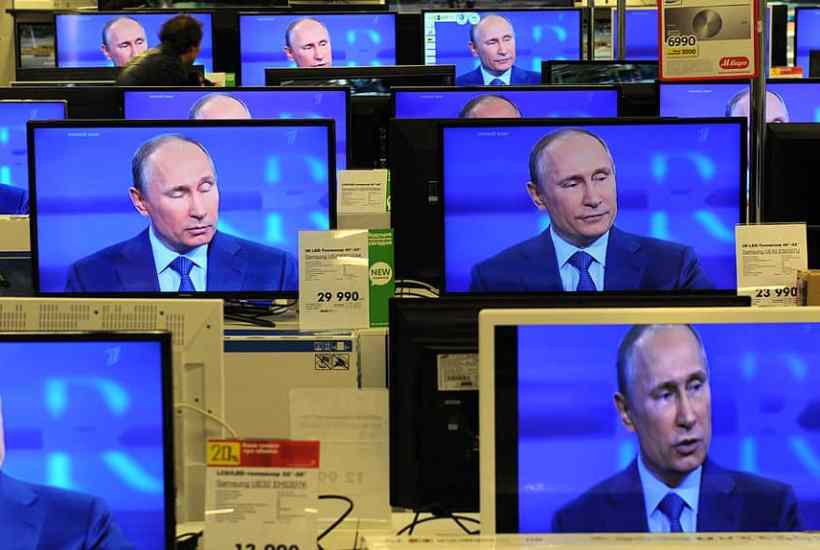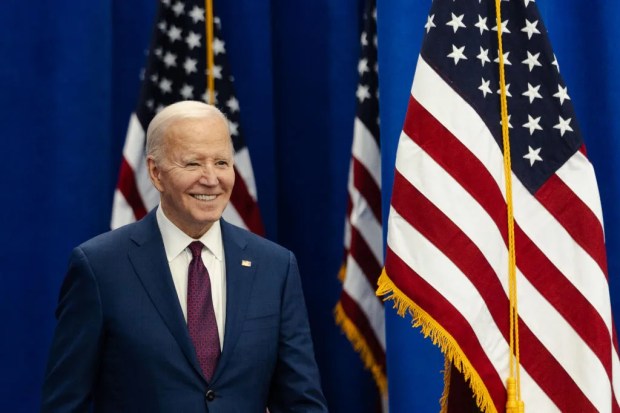‘The truth is with us,’ said Vladimir Putin in a speech after the Ukrainian regions of Luhansk, Donetsk, Zaporizhzhia and Kherson ‘voted to rejoin’ Russia on 30 September. ‘And the power is in truth, and that means we will be victorious.’
Putin’s harping on ‘truth’ – even as he annexed four regions of Ukraine following referenda almost universally believed to be shams – has strong roots in Russian culture. Historically it has never been hard to sell the Russian people notions of their own rectitude, even at their darkest moments. The Russians, this world view assumes, are a uniquely spiritual people and incapable of actual malice – whatever they do – towards their neighbour countries. This idea dates back at least as far as Dostoyevsky, with his insistence that – unlike a fragmented and morally nebulous west – Russians had ‘a gift for humanity’ and a sympathy ‘with all that is human regardless of blood, nationality and soil.’
But for decades the sentiment was in hibernation mode, to be reactivated with a vengeance at the turn of the 21st century. No artworks were more instrumental here than Aleksei Balabanov’s Brat (‘Brother’) films, released in 1997 and 2000, now both featured on Netflix as part of its patchy offering of Russian cinema. In many ways their values have underwritten Putin’s entire Ukrainian project, in 2022.
The first Brat film, made in 1997 on a budget of about $20,000 (£18,000), with a soundtrack featuring some of the decade’s greatest Russian music, tells the story of Danila Bagrov (Sergei Bodrov jnr.), a sweet-hearted veteran of the Chechen war coerced by his older brother Viktor into becoming a St. Petersburg hitman.
Shot through a dirty brown filter, Brat vividly captured the flavour of the Yeltsin years, giving us the drug-addicts, the racketeering thugs and assassins, the old and vulnerable selling off their paltry possessions in the street. Meanwhile, the film’s sequel Brat 2 (2000) – a glossier, tackier, big-budget production – depicted a Russia getting up off its knees, as Danila and Viktor jet off to America to rescue a friend in trouble, taking on the locals and locking horns with a Ukrainian crime cartel.
The sense of a new kind of hero in Russia – who could battle gangs of criminals using just his wits and military knowledge of firearms and explosives – bucked the Russian people enormously. Just as James Bond’s appearance in Britain salved the people’s loss of Empire, Danila and his antics steadied the Russians through their own diminished world power.
Nor was Danila alone for long. His emergence was swiftly followed by that of Vladimir Putin, with his corresponding background in the services (albeit the shadier ones). The billboard slogan for Komsomolskaya Pravda newspaper underlined the link: ‘Putin is our president and Danila is our brother.’ It was to remain the paper’s slogan for the next three years.
Bodrov Junior, like director Balabanov, was made an instant star by the movies. Tall, baby-faced and handsome – son of famous playwright and director Sergei Senior – Bodrov, with his background in fine arts, was an actor of real pedigree. For a time his face was everywhere, a symbol of Russian resurgence. Television clips of Bodrov Junior – who would later die tragically in an avalanche – have been wheeled out this year in support of Putin’s invasion, the actor having declared in 2000 that:
‘During a war one cannot speak poorly of one’s own….Even if your country is wrong during the war, you shouldn’t speak ill of it.’
That the Putin government, soon after 24 February, introduced prison sentences of up to 15 years for doing so gave some back-up to his words.
Yet the notion of Russian wrongdoing is almost absent from both Brat 1 & 2. Nearly all the Russian characters, however sordid, seem enfolded in a kind of universal forgiveness. Danila, even as he goes about blasting his enemies and serving up Biblical justice (often to those who have done him no personal wrong) remains a Holy Fool – Dostoevsky’s Prince Myshkin with a sawn-off shotgun, always ready to lend a hand to his brother Russians. The unipolar Americans have their money and power, but the Russians – whatever their material degradation – have hung onto their souls.
‘American,’ Danila says in a famous line from Part 2, ‘What’s your power?… You’ve got lots of money – so what? Truth is a real power. Whoever is right is strong. You cheated a man and took away his money. Did it make you stronger? No, it did not….’
In a 2012 phone-in, Putin echoed these words from Balabanov’s film. Russians, he said, were ‘less calculating than representatives of other peoples, and we have bigger hearts…Our people have a more generous spirit.’ Ominously, he also managed to link these qualities to military service. Even death, he added, ‘may be beautiful if it serves the people: death for one’s friends, one’s people or for the homeland…These are the deep roots of our patriotism…’
In the Brat films, that ‘patriotism’ often leads to an uncomfortable sense of ‘us’ and ‘them’. Other groups apart from Americans come in for a kicking. Danila declares himself ‘not too keen on Jews’, Chechens are referred to as ‘black beasts’, and in Brat 2, as Danila and his brother encounter Ukrainian gangsters, the word ‘kokhly’ (a derogatory tag for Ukrainians) gets tossed about with relish. Old wounds and resentments between the two countries are given new life: in Ukraine the film was subsequently banned.
None of this damages the sense of Russian righteousness in Balabanov’s films. ‘Russia looks after its own in time of war’, Danila tells us proudly. ‘Russians don’t cheat each other’, ‘Russians don’t surrender,’ other characters assure us. Such cheesy sentiments have flowed from the Kremlin media machine this year too.
‘Russia has lived through many wars, but never attacked anyone first,’ Putin’s press-secretary Dmitry Peskov said absurdly in February. More recently, stating that Russia was ready for negotiations, Peskov claimed that ‘our country stands for international harmony based on mutual respect…The Western approach is harsher, more egoistic. And if we look across the ocean – there, he who has a bigger gun is always right’. The last line, barring the diplomatic jargon preceding it, might have come straight from Balabanov’s films.
But is Peskov serious? And was Balabanov? The films – moral self-aggrandisement, racial epithets and all – are served up as knowing postmodern black comedy, and there was considerable laughter in cinemas on their release. Audiences were delighted by at least a vision of a world in which Danila was the face of modern Russia and their country the leading actor in events. It reduced the all-conquering Americans to spiritual paupers and Ukraine, once again, to a Russian borderland.
Very few people saw Russian nationalism as an important factor in politics at that time, and the Brat films surely inhabited a closed and relatively harmless ironic universe. But there was a shard of sincerity in every wisecrack, as well as in that assumption of ineffable Russian benevolence and access to the truth. This year, at any rate, Balabanov’s ‘joke’ assumed a horribly concrete shape.
The Ukrainians ‘are a fraternal nation’, Putin famously declared, shortly before launching his murderous invasion this year. But Zelensky, in a Telegram postfollowing Russia’s attacks on Ukrainian infrastructure on 11 September, was ferociously sardonic: ‘Read my lips… Without light or without you? Without you. Without water or without you? Without you… Cold, hunger, darkness and thirst are not as scary and deadly for us as your “Friendship and brotherhood”.’
That at least – Balabanov’s Brotherfilms aside – has the ring of truth, as Putin publicly manoeuvres his nuclear weapons westwards, threatening to give this ‘sibling-nation’ the deadliest and most suffocating of Russian brotherly hugs.
Got something to add? Join the discussion and comment below.
Get 10 issues for just $10
Subscribe to The Spectator Australia today for the next 10 magazine issues, plus full online access, for just $10.



















Comments
Don't miss out
Join the conversation with other Spectator Australia readers. Subscribe to leave a comment.
SUBSCRIBEAlready a subscriber? Log in